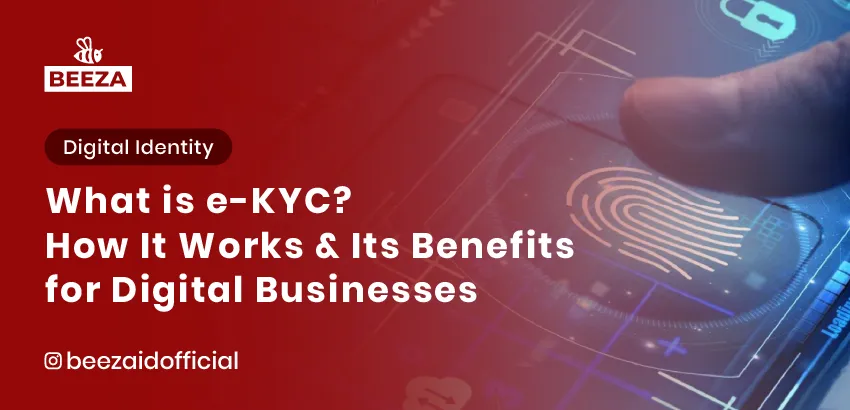
Introduction: What is eKYC
In today’s digital landscape, the need for secure and efficient customer verification has become more critical than ever. Electronic Know Your Customer, or eKYC, offers a modern solution that allows businesses to verify customer identities online without the need for physical interaction. As digital transformation accelerates across industries, eKYC plays a pivotal role in enhancing user experience, reducing fraud, and ensuring regulatory compliance.
In this article, we will explore what eKYC is, how it works, and the significant benefits it offers to digital businesses seeking to streamline operations and deliver superior customer service.
What is eKYC?
Electronic Know Your Customer (eKYC) is a digital process of verifying the identity of individuals remotely using electronic means. It replaces traditional in-person KYC procedures by utilizing biometric verification, document scanning, and data analytics to authenticate customer identities. eKYC is widely used in industries like banking, fintech, telecommunications, and insurance, where customer onboarding and regulatory compliance are crucial.
eKYC solutions often leverage technologies such as Artificial Intelligence (AI), Optical Character Recognition (OCR), and facial recognition to ensure secure and accurate verification. These tools not only enhance the speed of the verification process but also minimize the risk of human error.
How Does eKYC Work?
The eKYC process typically involves several steps:
1. Data Collection
Customers submit personal information and upload supporting identity documents (e.g., national ID, passport, driver’s license) through a secure digital platform or mobile application.
2. Document Verification
AI and OCR technologies analyze and extract data from the submitted documents to ensure they are authentic and not tampered with. Security features such as watermarks and holograms are also checked.
3. Biometric Verification
The system may require a selfie or live video to perform facial recognition and match the image with the photo on the submitted ID document. In some cases, fingerprint or voice recognition is also used.
4. Data Validation
The collected data is cross-referenced with trusted databases, such as government or financial institutions, to confirm accuracy and compliance with regulatory requirements.
5. Approval or Rejection
Based on the verification results, the system either approves or rejects the customer’s application. The entire process can be completed within minutes, offering a seamless experience.
Benefits of eKYC for Digital Businesses
Implementing eKYC brings a range of benefits to businesses operating in digital environments:
1. Faster Customer Onboarding
With eKYC, customers can be verified in real-time, significantly reducing the onboarding time from days to minutes. This speed enhances user satisfaction and encourages higher conversion rates.
2. Enhanced Security and Fraud Prevention
eKYC systems are equipped with advanced security measures, including biometric authentication and AI-driven analysis, which help detect fraudulent activities and protect both businesses and customers.
3. Cost Efficiency
By automating the verification process, businesses can reduce the operational costs associated with manual KYC, such as staff, physical infrastructure, and paperwork.
4. Compliance with Regulations
eKYC helps businesses meet local and international regulatory requirements for identity verification and anti-money laundering (AML) practices, avoiding potential penalties.
5. Improved Customer Experience
A smooth and quick verification process increases customer satisfaction, reducing drop-off rates during registration and fostering trust in the brand.
6. Scalability and Flexibility
Digital eKYC systems can handle large volumes of verification requests, making them ideal for growing businesses that need scalable solutions. They can also be customized to fit specific industry needs.
7. Environmental Impact
By eliminating paper-based processes, eKYC contributes to sustainability efforts, reducing the carbon footprint and promoting environmentally friendly practices.
Real-World Applications of eKYC
- Banking and Fintech: Opening accounts, loan applications, and investment onboarding.
- Telecommunications: SIM card registration and mobile service activation.
- E-commerce and Payment Platforms: Customer verification for secure transactions.
- Healthcare: Patient identity verification for telemedicine services.
Choosing the Right eKYC Solution
When selecting an eKYC solution, businesses should consider factors such as compliance with local regulations, ease of integration with existing systems, scalability, and the level of security provided. Collaborating with an experienced IT solutions provider can help ensure a seamless and secure implementation.
Conclusion
eKYC has transformed the way digital businesses verify and onboard their customers. By leveraging advanced technologies, it offers a fast, secure, and cost-effective alternative to traditional verification methods. Embracing eKYC not only helps businesses stay compliant but also enhances customer trust and operational efficiency.
Is your business ready to leverage eKYC for digital transformation?
Take the next step toward seamless digital verification. Contact Beeza for expert consultation on implementing eKYC solutions tailored to your business needs. Explore other innovative solutions to support your business growth in the digital era.